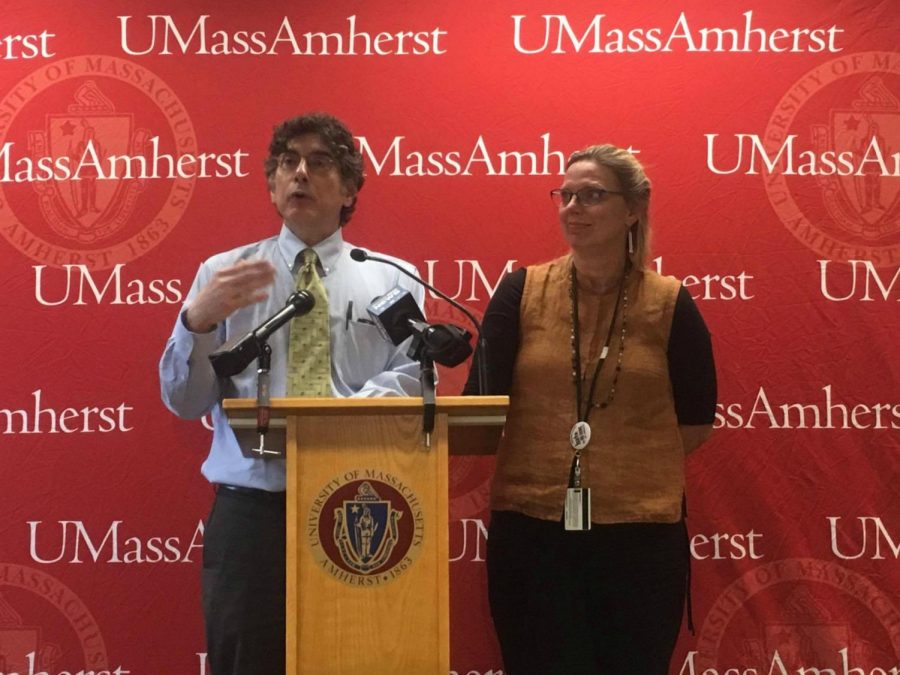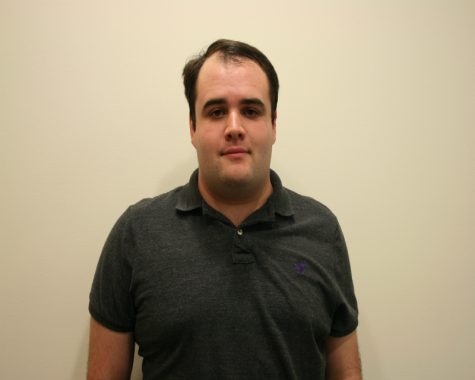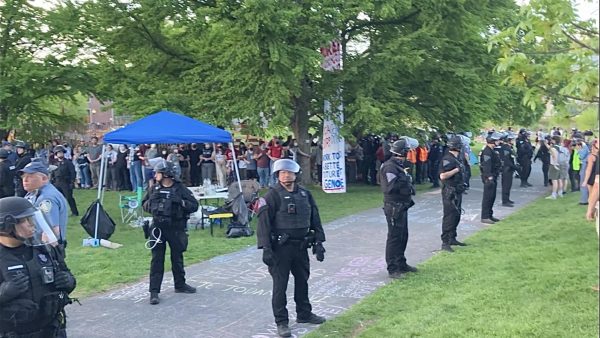Second case of meningococcal disease diagnosed at UMass
University Health Services Executive Director Dr. George Corey (left) and Public Health Nurse Ann Becker (right) address a crowd at a press conference in the Campus Center on Tuesday. (Cameron Merritt/Amherst Wire)
AMHERST — For the second time in two months, a University of Massachusetts Amherst student has been diagnosed with a meningococcal disease.
University Health Services sent out a campus-wide email Tuesday telling community members that a student living in a residential hall on campus was diagnosed with a meningococcal disease over the weekend, and is currently in stable condition at an area hospital.
This comes just three weeks after another student was diagnosed with a meningococcal serogroup B infection — a strain not protected by the required meningitis vaccine for incoming students. After being initially treated at UHS, he was taken to a local hospital where he is now in stable condition.
Neither of the students were in close contact with each other, according to UHS Public Health Nurse Ann Becker, which is something she said was a bit concerning. The serogroup of the second patient is currently unknown at this time.
“We also reached out to the people who we think may be exposed in any way whatsoever to the ill student from over the weekend,” Becker said. “We’ve reached out to all those students and have invited them in to come get the prophylactic antibiotic.”
According to Becker, around 40 students have come into UHS to receive the prophylactic antibiotic, a medication designed to help protect those exposed from contracting the disease. The priority has been those who were in closest contact with the patient.
“Meningococcus is a bacteria that is most prevalent at the college age,” Dr. George Corey, Executive Director of UHS, said at a press conference at the UMass Campus Center on Tuesday. “It’s an illness that’s spread through close contact … It’s spread through saliva, through intimate contact.”
Corey urged students against sharing items or utensils that they’ve put in their mouths, as well as to be careful when it comes to intimate contact, as it’s the most common way for the disease to spread.
Students should also remember to practice basic hygiene, he said, including washing their hands regularly and avoiding touching their eyes, nose and mouth.
A vaccine for the serogroup B strain is now “readily available” at UHS as of Tuesday afternoon, and other local facilities according to Corey, who also suggested that students speak with their primary care doctors at home about being vaccinated over the upcoming break.
The vaccine requires two doses, which are spread about a month apart.
For those concerned about contracting the disease, they should get the shots.
“It does protect those in their immediate community. It does not establish a herd immunity,” Corey said. “So if a roommate of a patient is immunized, it does not protect the other roommate. That person would need to get the vaccine themselves to reduce their risks.”
“We are now actively receiving calls from patients and we’ve actively begun scheduling and giving the vaccine at [UHS], so we’ll be doing that as long as we have as many resources to meet that demand,” Corey said.
Meningococcal serogroup B, as a strain, is usually more prevalent in places such as Europe, Australia and New Zealand according to Corey, but it has been popping up in the United States, as the four more common strains that are required to be vaccinated against — A, C, Y and W — have been on the decline.
UHS has been offering the vaccine for about two years, according to Corey, though there hasn’t been much demand for it until now.
As for making it a required vaccination, the decision would be up to the Commonwealth of Massachusetts rather than UMass.
“That sort of designation really comes from the state health department,” Becker said. “We don’t decide mandatory vaccination or matriculation vaccination requirements, that’s decided at the state health department.”
UHS urges those concerned about the illness to contact their triage nurse at (413) 577-5299.
Email Cameron at [email protected], or follow him on Twitter @CamMerritt_News.











